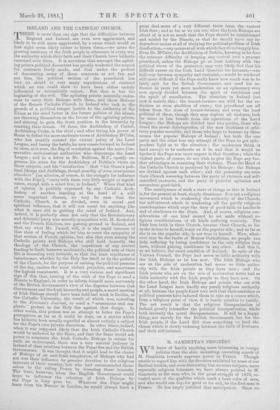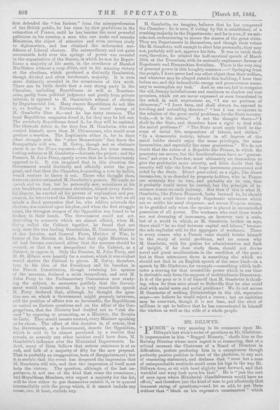M. GAMBETTA'S PROGRESS.
WE know of hardly anything more interesting in foreign politics than the slow, unhasting, unseating march of M. Gambetta towards supreme power in France. Though unable to regard him with the devotion exhibited by some of our Radical friends, and even distrusting him on some subjects, more especially religious tolerance, we have always pointed to M. Gambetta, as the man who, in the great struggle of 1870, re- vealed most of the qualities which mark a born ruler of men, and who would one day, for good or for evil, he the first men in France. lie has amply justified that anticipation. Since we first defended the " fou furieux " from the misapprehension of the British public, ho has risen by slow gradations in the estimation of France, until he has become the most powerful politician in his country, a man who can make and unmake Ministries, the object of attentive and even anxious study to diplomatists, and has obtained the unbounded con- fidence of Liberal electors. His extraordinary and not quite accountable hold over the springs of power was revealed in the organisation of the Senate, in which he won for Repub- licans a majority of life seats, in the overthrow of Marshal MacMahon without a coup d'etat, and in his amazing victory at the elections, which produced a distinctly Gambettist, though divided and often incoherent, majority. It is even more distinctly revealed in the occurrences of this week. There can be little doubt that a very strong party in the Chamber, including Republicans as well as Reaction- aries, partly from political judgment and partly from private interest, is opposed to M. Gambetta's scheme of election by Departmental list. Many sincere Republicans do not like ir, as leading to a Dictatorship. No secret enemy of M. Gambetta likes it,—and he has many enemies. The local Republican magnates dread it, for they may be left out. The crotchety Republicans dread it, for they will be omitted. The Clericals detest it, for they fear M. Gambetta, who can control himself, more than M. Chlmenceau, who would soon produce a reaction. The Legitimists abhor it, for in their silent struggle with the "other Monarchists" they know the Bonapartists will win. M. Gre'sry, though not as obstinate about it. as the Tiozes reported—the Times, for some reason, (Jolting askance at M. Gambetta,—distrusts the project ; and the Premier, M. Jules Ferry, openly avows that he is determinately opposed to it. It was imagined that in this situation the Government would decidedly and officially resist the pro- posal, and that then the Chamber, demanding a vote by ballot, would venture to throw it out. Those who thought thus, however, nder-estimated. M. Gambetta's powers. He made no Apeech and no fuss, but he personally saw, sometimes at his own breakfasts and sometimes elsewhere, almost every doubt- ful Deputy, he exerted all his powers of explanation and per- auasion, he interviewed the Ministers one by one, he left on all minds a fixed persuasion that he, who seldom misreads the electors, was resolved upon his plan, and when the first struggle came, the strongest weapon of the Opposition was found to be broken in their hands. The Government could not act. According to accounts which are almost official, when M. tir6sy- called the Cabinet together, he found that not only were the two leading Gambettiste, M. Constans, Minister of the Interior, and General Farre, Minister of War, in favour of the Serutin do Liste, but that eight Ministers in all had become convinced either that the measure should be carried, or that it was inexpedient for the Cabinet, as a tlabinet, to oppose it. Only the Premier, M. Jules Ferry, and M. St. Hilaire were heartily for a contest, which it was evident would shatter the Cabinet to pieces. M. Gravy, therefore, true to his idea of the Presidency and its function in the French Constitution, though retaining his opinion of the measure, declared a crisis inexpedient, and sent M. Jules Ferry to the Parliamentary Commission now study- ing the subject, to announce publicly that the Govern- ment would remain neutral. In a very remarkable speech M. Ferry declared that, although ho thought the ques- tion one on which a Government might properly intervene, still the position of affairs was so favourable, the Republicans
so united on Eastern questions and on the affair of the Con- gregations, that the Ministry had decided not to "risk dis- cord " by opposing or promoting, as a Ministry, the Scrutia Liste. They would remain neutral, every Minister speaking as he chose. The effect of this decision is, of course, that i he Government, as a Government, deserts the Opposition, which is said to be almost paralysed by a resolve that reveals, as scarcely any other incident could have done, M. Gambotta's influence over the Ministerial Departments. In- deed, many of them believe that serious resistance is at an end, and talk of a majority of fifty for the new proposal. That is probably an exaggeration, born of disappointment; but it is certain that the event has deepened the impression that M. Gambetta will win, and that the impression of itself must
help the victory, The question, although of the last im- portancei is not one of the kind that rouse the conscience ;
and Republican Members, who expect a majority for the list, will be slow either to put themselves outside it, or to quarrel irreeoncilably with the group which, if it cannot include any name, can, at least, exclude any. M. Gambetta, we imagine, believes that he has conquered the Chamber ; he is sure, if voting by list is established, of a crushing majority in the Departments ; and he is now, if we mis- take not, endeavouring to secure the masses of the great cities. They are Departments in themselves, and though their voters like M. Gambetta well enough to elect him personally, they may not, probably will not, approve his lists. It was to catch their ears, therefore, ho uttered the half-mystical speech of March 20th at the Trocadero, with its curiously unpleasant flavour of Napoleonic and Bismarckian Socialism. There is the very ring of personal power in this haughty sentence :—" Springing from the people, I have never had any other object than their welfare, and whatever may be alleged outside this building, I have time before me, and the indomitable energy and perseverance neces- sary to accomplish my task." And no one can fail to recognise the old, dreamy indefiniteness and readiness to shadow out vast promises, which yet are never expressed or even formulated in the mind, in such expressions as, "I am no partisan of chimaeras ;" "I have been, and shall always be, opposed to levelling and unhealthy theories ;" "but I can co-operate in the solution of the great social problems, for the State is every- body,—it is the nation." Is not the thought there—" I shall be the State, and therefore have a right to deal with the social problems I" " The State must apply itself to the sores of social life, suspensions of labour, and strikes."
In a democratic society, labour in all degrees of the social ladder should enjoy the same privileges, the same immunities, and especially the same guarantees." We do not doubt that the rulers of a Republic like France, in which the peasantry are secure, but the handicraftsmen have no " guaran- tees," not even a Poor-law, must ultimately set themselves to give the proletariat more security, and little doubt that the security will take the form of huge insurances guaranteed and aided by the State. Direct poor-relief, as a right, like direct income-tax, is so dreaded by property-holders, who in France are certainly five to two, and probably six to one, that it probably could never be carried, but the principle of in- surance rouses no such jealousy. But then if this is what M. Gambetta, like Prince Bismarck, looks forward to, be should say so, and avoid those cloudy Napoleonic utterances which are so unlike his usual eloquence, and arouse Utopian visions, to be gratified only when the speaker is placed in uncontrolled possession of all power. The workmen who read these words are not dreaming of insurances, on however vast a scale, but of a world in which, as M. Gambetta further on says, there shall " be no duel between capital and labour," because the sole capitalist will be the aggregate of workmen. There is every reason why a French ruler should betake himself to the study of social problems, and no reason why M. Gambetta, with his genius for administration and flash of insight, if he does study them, should not devise novel and great ameliorations in the condition of the poor ; but in these utterances there is something else which we should not find in an English speech of the same kind—in a speech by Mr. Gladstone, for example—something which indi- cates a craving for that irresistible power which in our time is derivable only from the support of multitudinous Democracy.
Is it of the poor or is it of himself that M. Gambetta is think- ing, when he thus cries aloud to Belleville that he also could deal with social sores and social problems $ We do not accuse M. Gambetta of seeking Dictatorships in the old, repressive sense—we believe he would reject a crown ; but an ambition may be over-vast, though it is not base, and the elect of millions is apt to believe that he has concentrated in himself the wisdom as well as the wills of a whole people.



































 Previous page
Previous page